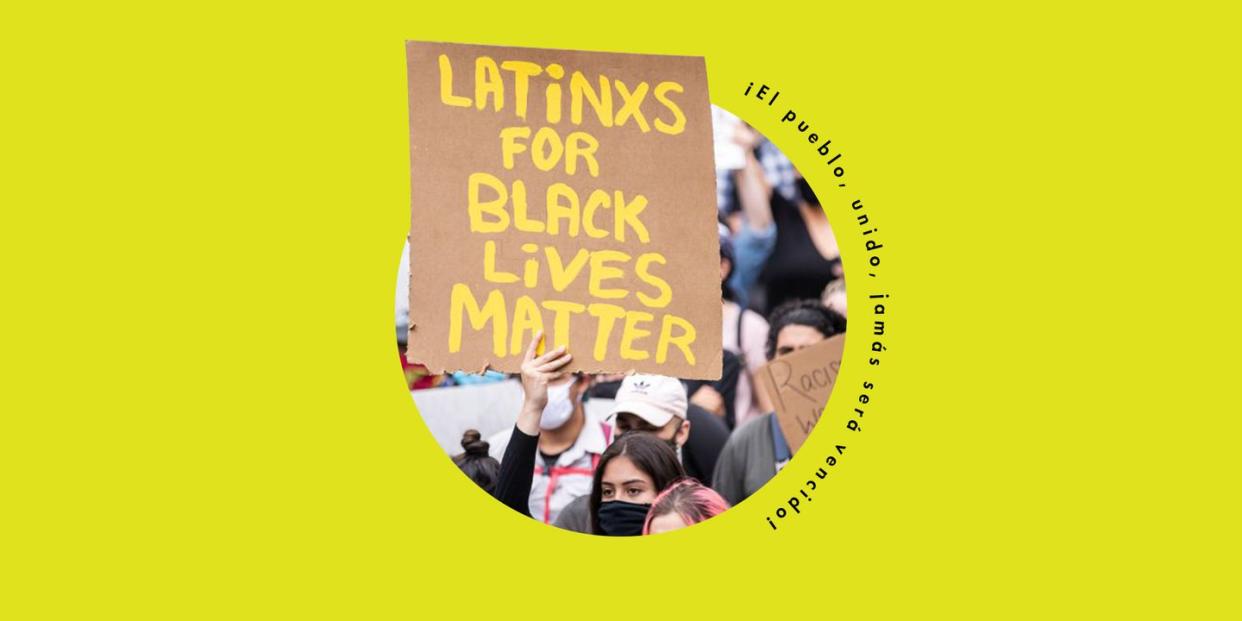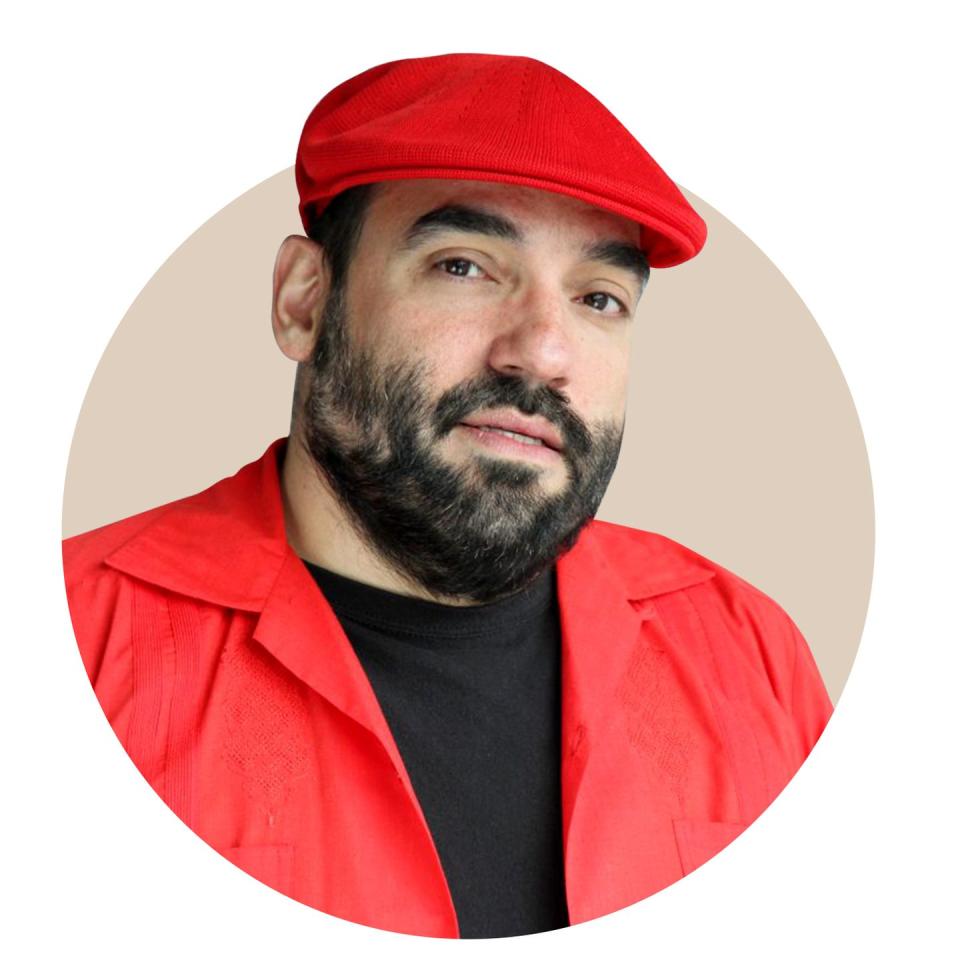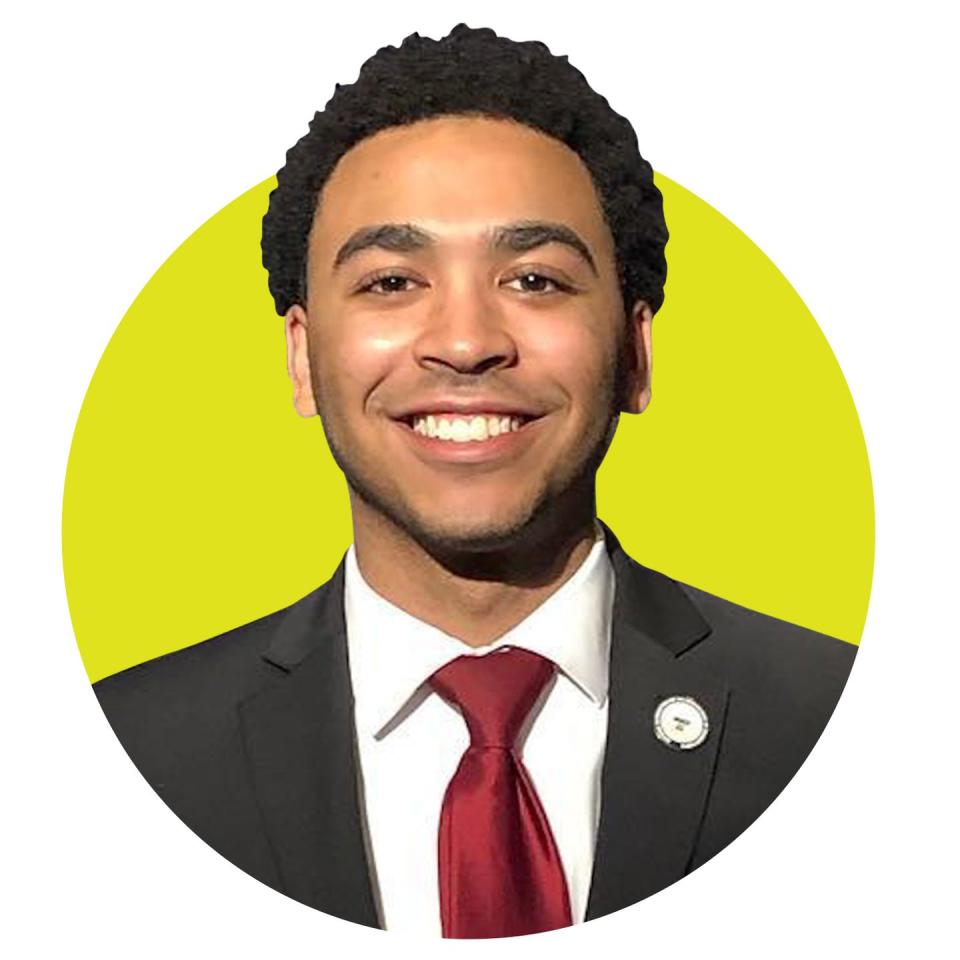How to Talk to Your Latinx Parents About Black Lives Matter

For many Latinxs, identity is a complicated thing. Latin America is made up of numerous different countries, across two continents, each one with its own unique histories, traumas, cultures, and, of course, populations. Our differences can make these “tough conversations” about race challenging to navigate—as does language, the unfortunate prevalence of misogyny, and our countries’ histories of colonialism, Black erasure and violence.
There seems to be a myth in Latin America that—unlike the United States—there isn’t a race issue. It’s naive to think of our nations’ caste systems in a way that doesn’t consider race in addition to class. Just look at mestizaje ("race mixture"), or the common belief that all Latinxs are “mixed” in some way, and therefore incapable of perpetuating racial hierarchies. This is not only false, but works to conceal how deeply rooted white supremacy, in part a result of European and American colonization, is in Latinx culture.
There isn't even enough room here to fully go into the role that colorism has played in Latinx culture. Like blanqueamiento, or the ideological project of whitening that governments in Latin America employed to encourage whiter populations (AKA the project of "improving the race," or mejorar la raza), whether by incentivizing European immigration or through outright violence.
Even normal family interactions can be steeped in anti-Blackness. Take, for example, the praise light-skinned, light-eyed babies get thanks to their complexion. Or the approval someone might receive for bringing home a light-skinned partner. And the inverse is also true: my mother, a very light-skinned Afro-descendant woman, once told me how my grandfather forbid her from having a relationship with a darker-skinned Afro-Colombian boy for fear of her and her children going in the "wrong direction." For me, growing up with curly hair—or for my mother with her kinky hair—hearing pelo malo ("bad hair"), peinese ("brush your hair"), or “you look better with your hair straight” was a common (and painful) occurrence.
Which brings me to: Talking to our Latinx parents about Black Lives Matter. Remember that you won’t be able to change anyone’s mind overnight, or bring them up to speed on an entire topic in one sitting. If you have immigrant parents, they might not have ever learned about American slavery, Jim Crow, the civil rights movement, or the history of mass incarceration and prison industrial complex. Lead with patience and thoughtfulness. Having experienced discrimination ourselves, Latinxs are in a good spot to empathize and understand what Black and Afro-Latinx communities are facing. Let’s do this.
I spoke with three experts about how to navigate these conversations.

Julie Dowling PhD, is a Latina sociologist who is an Associate Professor in the Department of Latina/Latino Studies at the University of Illinois at Urbana-Champaign. She has published articles on Latino racial identity construction and racial attitudes in a variety of journals. Dr. Dowling's research has focused on the US Census and how definitions of race and ethnicity are understood by Latinos. Her book, Mexican Americans and the Question of Race, explored the disjuncture between federal definitions and regional constructions of race, examining Mexican American responses to the U.S. Census race question. In the book, she examines how a Mexican Americans position themselves relative to whiteness and blackness. Her current research project focuses on how various racial groups feel about the government."

T. Urayoán Noel PhD is a Puerto Rican poet, critic, performer, and translator, who is currently an associate professor of English and Spanish at New York University and also teaches at Stetson University’s MFA of the Americas. He is the author of eight books of poetry, including Buzzing Hemisphere/Rumor Hemisférico (2015) and the forthcoming Transversal, both with the University of Arizona Press.

Ramon Contreras is a young Afro-Latino activist and aspiring civil rights attorney from Harlem. Ramon founded Youth Over Guns in 2018 to bring more awareness to gun violence in Black and Brown communities and since then has traveled the country advocating for gun safety laws. Ramon also works on making voting more accessible to young people in America and promotes civic engagement throughout the country.
“Why should non-Black Latinxs care about these protests?”
Julie Dowling, PhD: Well, the short answer is that everyone should care about Black lives—people of all races should care about the deaths of Black people at the hands of the state. We should all want justice and racial equity. Also, Latinx—both Afro-Latinxs and non-Black Latinxs—face racial profiling and discrimination from the police both historically and currently, including brutal immigration and detention policies. So policing is an issue for the Latinx community that impacts non-Black Latinxs too, and therefore protests calling for police accountability and alternatives to incarceration are of crucial importance for Latinxs.
La respuesta corta es que a todos nos debería importar las vidas Negras– a las personas de todas las razas les debería importar las muertes de personas Negras a manos del Estado. Todos deberíamos querer justicia e igualdad racial. Además, Latinos–tanto Afro-Latinos como Latinos que no son Negros–enfrentan caracterizaciones raciales y discriminación por parte de la policía a través de la historia y hasta hoy en día,– incluyendo normas brutales de inmigración y detención. Entonces el patrullaje es un problema para la comunidad Latina que también afecta a Latinos que no son Negros, es por eso que las protestas que piden que la policía tome responsabilidad por sus acciones y que encuentren otras alternativas a el encarcelamiento son de gran importancia para todos los Latinos.
T. Urayoán Noel PhD: Because poor Latinx communities are also targeted by the police. Because an unchecked police is incompatible with democracy. Also, many poor and working class non-Black Latinxs live in historically racialized communities, and thus are subject to structural racism. One way to think about these protests is to ask ourselves why there is so much money for the policing and occupation of these Black and racialized communities, but not a concerted effort to remedy long-standing inequities in health, education, and so on.
Porque comunidades de Latinxs de bajos recursos también son víctimas de la violencia policial. Porque un sistema policial desenfrenado es incompatible con la democracia. Además muchos Latinxs pobres y de clase trabajadora, que no se identifican como Negros, viven en comunidades históricamente racializadas, y por lo tanto también son sometidos al racismo estructural. Una forma de pensar en estas protestas es preguntarnos, por que hay tanto dinero para el patrullaje y ocupación de estas comunidades negras y racializadas, pero no hay un esfuerzo concertado para reparar las desigualdades profundas en los sistemas de salud, educación y etc.
“What about us? Where are the marches and outrage over the treatment of undocumented people when they are being killed and put in cages?
Ramon Contreras: We're protesting the racial and cultural bias of every law enforcement system in America. When we call for justice, it includes everyone, including immigrants who are targeted solely because of their background. We're fighting the same fight and are in the same struggle to end discrimination.
Estamos protestando el prejuicio racial y cultural de cada sistema de ley en los Estados Unidos. Cuando pedimos justicia, eso nos incluye a todos, incluyendo a los inmigrantes que son discriminados exclusivamente por su origen. Estamos peleando la misma pelea, y estamos juntos en la misma batalla para terminar la discriminación.
Julie Dowling, PhD: We can be outraged about undocumented children separated from their parents AND about Black people dying at the hands of police. We can see these issues as related—as being about state violence against people of color. And we can unite to fight.
Podemos sentir furia cuando niños indocumentados son separados de sus padres Y TAMBIEN cuando personas Negras mueren en manos del Estado. Podemos ver que estos problemas están relacionados, que se tratan de violencia estatal en contra de personas de color. Y podemos unirnos en esta pelea.
T. Urayoán Noel PhD: Black Lives Matter has been fighting against deportations and for undocumented people for years, but this is not something that gets a lot of attention in a media landscape that eschews complexity and fuels polarization. Furthermore, as writers and activists like Alan Pelaez Lopez remind us, a lot of undocumented people are also Black (and Indigenous and queer and nonbinary), so if we frame this as "us versus them," we are erasing people in our own communities and reproducing a dangerous media narrative.
El movimiento de Las Vidas Negras ha estado peleando en contra de las deportaciones y en favor de personas indocumentadas por años, pero esto no es algo que recibe mucha atención en un mundo mediático que evita la complejidad y alimenta la polarización. Es más, escritores y activistas como Alan Pelaez Lopez nos recuerda que muchas personas indocumentadas también son Negras (e Indígenas, y LGBTA+), entonces si planteamos esto como “nosotros versus ellos” estamos borrando a personas en nuestras propias comunidades y propagando en los medios una historia peligrosa.
“Why use the term Afro-Latinx?”
Ramon Contreras: The term Afro-Latinx acknowledges my history and roots as a Black Latino. My ancestors are descendants from Africa and were brought over to the island of Hispaniola, where Europeans enslaved them. Our history represents colonialism and white supremacy that took the lives of millions throughout history. The term Afro-Latino is who I am by blood and history. To not acknowledge the term means not acknowledging the brutal history that is the result of many injustices today.
El término Afro-Latinx reconoce mi historia y mis raíces como un Latino Negro. Mis ancestros son Afro-descendientes y fueron traídos a la isla de Hispaniola donde los Europeos los esclavizaron. Nuestra historia representa el colonialismo y la supremacía blanca que tomo la vida de tantos millones a través de la historia. El término Afro-Latino es quien soy de sangre y de historia. El no reconocer esta frase, significa no reconocer esa historia brutal, que es la razón de muchas de las injusticias de hoy en día.
T. Urayoán Noel PhD: To celebrate the impact and significance of African diaspora cultures as they have evolved in the Americas and helped shape Latinx culture. Musical forms such as salsa, merengue, and reggaeton have African roots but are a product of Afro-Caribbean Latin America and its diasporic histories in cities like New York. These cultural productions have global reach but are rooted in Afro-Latinx histories and experiences, and should be recognized as such.
Para celebrar el impacto y el significado de culturas Afro-descendientes y como se han desarrollado en las Américas, ayudando a moldear la cultura Latinoamericana. Tipos de musicá como la salsa, el merengue, y el reggaeton tienen raíces Africanas, pero son el producto de una Latinoamérica Afro-Caribe y sus historias diasporicas en ciudades como Nueva York. Estos productos culturales tienen un alcance global, pero son arraigadas en las experiencias e historias Afro-Latinx y deberían ser reconocidas.
“How has anti-Blackness affected the Latinx community in the U.S.?”
Ramon Contreras: Many Latinxs refuse to acknowledge their Blackness and history. In America, success is often linked with being white, and many Latinxs don't like to identify with their Black culture because it usually means less opportunities.
Muchos Latinxs se niegan a reconocer sus historias y raíces Negras. En los Estados Unidos el éxito es frecuentemente asociada con ser blanco, y muchos Latinxs no les gusta asociarse con su cultura Negra porque muchas veces significa menos oportunidades.
T. Urayoán Noel PhD: There is a long history of colorism within U.S. Latinx communities, where proximity to whiteness is valued and Blackness is frowned upon. Also, white-passing Latinxs benefit from the privileges of whiteness, even when they do not identify as white.
Hay una larga historia de colorismo en las comunidades Latinx en los Estados Unidos, donde la proximidad a lo blanco es valorada y la negrura es reprochada. Además Latinxs que pueden pasar físicamente como blancos se benefician de ese privilegio blanco incluso cuando no se identifican así.
“What does it look like for non-Black Latinxs to be allies?”
Ramon Contreras: Advocating for Black lives and showing up when people are fighting to end systems of oppression and also acknowledging that we all share the same aspirations for a better America that doesn't discriminate based on race, sexuality, gender, religion and social class.
Defender las vidas Negras y demostrar apoyo cuando las personas estén peleando para terminar sistemas de opresión. Tambien reconociendo que todos tenemos las mismas esperanzas para un América que no discrimine a las personas por raza, sexualidad, género, religión o clase social.
T. Urayoán Noel PhD: We need to move beyond allyship and interrogate our own Latinidad. We need to acknowledge its historical and ongoing proximity to whiteness while acknowledging Afro-Latinx histories and perspectives, even and especially when it is painful or uncomfortable to do so. In this moment of reckoning, allyship is not enough: we need to confront our histories and find alternative histories that are not euphemistic and do not rely on platitudes. "We are all mixed" is like "All lives matter." It misses the point, it deflects, and it assumes equality when the task at hand is working through radical difference and understanding ourselves in relationship to the power wielded over us and the power we wield.
Tenemos que ir más allá de ser aliados y interrogar nuestra propia Latinidad. Necesitamos reconocer la histórica y continua cercanía a la blancura, reconociendo las historias Afro-Latinas y sus perspectivas incluso y especialmente cuando, es doloroso e incómodo hacerlo. En este momento de ajuste, ser aliado no es suficiente: necesitamos confrontar nuestras historias y encontrar alternativas que no sean eufemísticas. “Todos somos mezclados” es como decir “Todas las Vidas Importan”; lo que malinterpreta el punto, desvía, y asume igualdad cuando el objetivo es analizar nuestras diferencias radicales y entendernos en relación al poder que se ejerce contra nosotros, y el poder que ejercemos.
You Might Also Like

